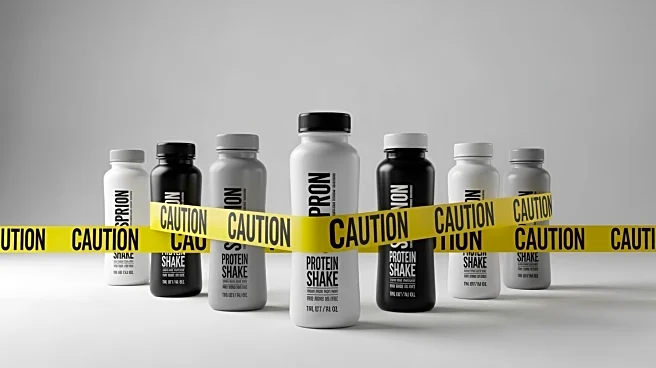What's Happening?
Consumer Reports has released findings indicating that over 70% of protein powders contain dangerously high levels of lead. The investigation highlighted plant-based powders, such as Naked Nutrition and Huel, which were found to have lead levels exceeding
1,200% of the recommended safe limit. Lead is a toxic heavy metal known to cause severe health issues, including permanent brain damage, especially in children. The report underscores the risks associated with lead exposure, which can lead to symptoms like fatigue, muscle aches, and cognitive difficulties. This revelation follows previous reports of lead contamination in consumer products, including applesauce pouches, which resulted in over 500 cases of lead poisoning.
Why It's Important?
The discovery of high lead levels in protein shakes is significant due to the potential health risks posed to consumers, particularly children. Lead exposure is linked to serious health conditions, including developmental disorders such as autism and ADHD. The findings may prompt increased scrutiny and regulatory action in the food industry to ensure product safety. Manufacturers may face legal challenges and consumer backlash, impacting their market reputation and financial performance. This situation highlights the need for rigorous testing and transparency in food production to protect public health.
What's Next?
In response to these findings, there may be increased pressure on manufacturers to improve testing protocols and reduce lead levels in their products. Regulatory agencies could implement stricter guidelines and conduct more frequent inspections to ensure compliance. Consumers may become more cautious, leading to shifts in purchasing behavior towards brands with verified safety standards. Legal actions against companies with contaminated products could escalate, potentially resulting in significant financial penalties and changes in industry practices.
Beyond the Headlines
The issue of lead contamination in food products raises broader ethical questions about corporate responsibility and consumer safety. It underscores the importance of transparency in ingredient sourcing and manufacturing processes. Long-term, this could lead to a cultural shift towards more sustainable and health-conscious food production practices. The situation also highlights the need for public education on the risks of heavy metal exposure and the importance of informed consumer choices.
















